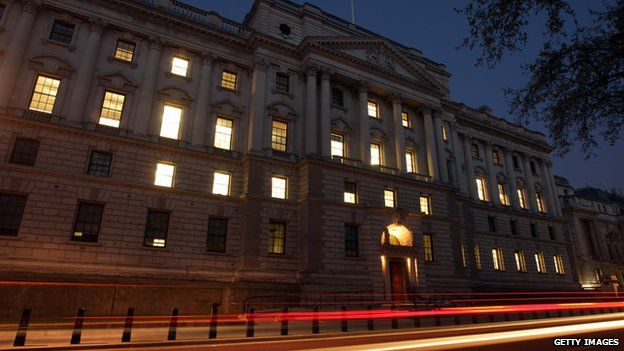Scottish independence: Yes vote could mean UK credit rating review, says Fitch
- Published

A vote for Scottish independence would delay the UK's return to triple A credit status, according to the ratings agency, Fitch.
The agency said there would be a "one off" increase in the UK's debt if Scotland left the UK.
It said it expected any transition to independence to be managed carefully, with compromises on either side.
And it would be in the rest of the UK's interests to make an independent Scotland "a success", it argued.
In its report, Fitch said it assumed a No vote was most likely in September's referendum, based on current polls, but a Yes vote would mean it would review the UK's credit rating.
The agency's report said there would be "moderate risks" in the areas of public debt, external finances, currency arrangements and the financial sector.
The Scottish government has said that, if voters back Yes in September's independence referendum, it regards 24 March 2016 to be "a realistic independence date".
Fitch said the UK's government's undertaking to honour all of the UK's debt would lead to "a one-off increase of 9.5% of GDP" in the UK debt ratio if Scotland became independent in 2016.
"We assume Scotland would gradually repay its loan to the UK," the report said.
"However, it would be illiquid and leave the UK exposed to Scottish credit risk, at least in the early years of independence."
Fitch said independence would "likely be mildly negative for the UK's balance of payments" as the UK would lose most of its oil export receipts to Scotland.
The report said that all of the possible currency options, "from a pegged or free-floating currency to a currency union", would pose risks to the remaining UK, including "competitive devaluation".
But it said that Fitch would expect a compromise could be reached between Scotland and the rest of the UK in any transitional negotiations.
"It would be in the best economic interests of the UK to ensure that an independent Scotland was, in the broadest terms, 'a success'", it said.
The agency added that some financial institutions could move their headquarters to London in the event of independence, which would "expand the size of the UK banking sector from an already high level of 492% of GDP; it would also increase cross-border and potentially cross-currency exposure".
In a previous assessment in 2012 the agency had concluded that Scottish independence would be likely to be neutral for the UK's credit rating, but said it had revised its view as it could no longer assume there would be "no impact on gross public debt".
In its new report it added: "We expect a compromise would be reached that is not punitive for either party. Given the institutional strength of the UK, we would expect the transition to be managed very carefully, avoiding major financial dislocations. Were this not the case the pressure on the ratings would be much higher".
Treasury analysis
The UK Treasury produced analysis predicting an independent Scotland would have the second highest deficit amongst advanced economies in its first year.
The Treasury analysis said Scotland would have a fiscal deficit of 5.5% of GDP in 2016-17, the equivalent to £9.5bn, or £1,760 per head of population.
The total would be about £1,000 more than the UK deficit per head in the same year, the Treasury said, contradicting Scottish government estimates of a deficit between 2.5% and 3.2%.
Chief Secretary to the Treasury Danny Alexander said: "A range of independent experts, including the IFS, CPPR, Citigroup, and now Fitch all show that the broad shoulders of the UK mean lower tax bills and higher spending on public services in Scotland."
But a Scottish government spokeswoman said: "This Fitch report shows exactly why it will be in the overwhelming economic interests of the rest of the UK to negotiate fairly and openly with Scotland following a vote for independence, ensuring a smooth transition.
"Their analysis makes clear the implication of Westminster's announcement that it would honour all existing debt.
"It also makes clear the potential implications for the rest of the UK's credit rating and its balance of payments.
"The Scottish government has outlined that we would take responsibility for our fair share of debt, and agree to service this alongside a wider agreement on assets and a formal currency union."